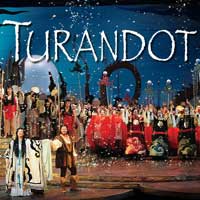
 Highly Recommended **** Fairy tales are, by definition, stories that don’t follow the rules of the real world. That sounds obvious, but it creates a problem for an author who is used to naturalistic characters, such as Giacomo Puccini. The composer of La bohème and Tosca was famously unable to finish Turandot, his adaptation of a Carlo Gozzi commedia dell’arte play that was ultimately based on a much older story, leaving it to be completed by his apprentice, Franco Alfano. It is widely celebrated for including some of his most beautiful melodies and intriguing characters, but getting the whole thing to mesh is a directorial challenge. In the new-to-Chicago-production now at the Lyric through the new year, director Rob Kearley’s solution is to set the play in a China that looks more like a post-apocalyptic Mars, apparently to allow us to accept the story more on its own terms.
Highly Recommended **** Fairy tales are, by definition, stories that don’t follow the rules of the real world. That sounds obvious, but it creates a problem for an author who is used to naturalistic characters, such as Giacomo Puccini. The composer of La bohème and Tosca was famously unable to finish Turandot, his adaptation of a Carlo Gozzi commedia dell’arte play that was ultimately based on a much older story, leaving it to be completed by his apprentice, Franco Alfano. It is widely celebrated for including some of his most beautiful melodies and intriguing characters, but getting the whole thing to mesh is a directorial challenge. In the new-to-Chicago-production now at the Lyric through the new year, director Rob Kearley’s solution is to set the play in a China that looks more like a post-apocalyptic Mars, apparently to allow us to accept the story more on its own terms.
A wandering Tatar prince (Stefano La Colla) arrives in Peking just in time to unexpectedly reunite with his deposed father (Andrea Silvestrelli) and his father’s last remaining slave, Liù (Maria Agresta in December, Janai Brugger in January). The occasion is the lavish public execution of another foreign prince. The princess of this land, Turandot (Amber Wagner), demands that any man seeking her hand in marriage must answer three riddles, and if he cannot, he forfeits his head. But none are able to resist her beauty, and the prince, instantly smitten, resolves to succeed where others have failed, against the advice of his loved ones, Turandot’s own courtiers, and even her father, the emperor (Josh Lovell). And even if he does succeed, that doesn’t mean he has won Turandot’s genuine affection.
As is not the case with other Orientalist operas, Puccini made a genuine effort to learn about Chinese music and incorporate it into his style. Conducted by Sir Andrew Davis, the result is rapturous and dramatic at every moment. We depend on Kearley’s heavy hints that something supernatural is at play to make those moments fit with each other, such as when the chorus rapidly changes their mind about whether they want the execution to occur, but with all the talk of binding oaths and the otherworldly appearance of Allen Charles Klein’s rickety production design, that’s not too far a leap. The glimpse we get of Turandot in Act I is striking enough to make her a formidable presence long before she appears onstage. When she does, Amber Wagner’s “In questa reggia” is regality defined and has the bearings of an unstoppable force. Her Turandot is a character clearly lonely and in a great deal of pain but whose strength and dignity proves admirable by the end of Act III.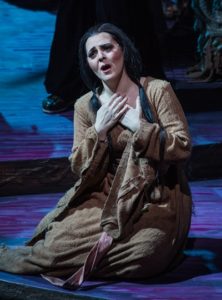
Another excellently sung characterization comes from Agresta, whose bashful smile when Liù admits she stuck with her master just because his son smiled at her once communicates a great deal of self-awareness. La Colla’s wandering prince is an enigmatic figure who came across as being as strange and remote as Turandot herself, if not more so. His “Nessun dorma” is perfectly pitched and seductive proclamation, which, with his character choices, is a bit eerie. Also somewhat unsettling are Zachary Nelson, Rodell Rosel, and Keith Jameson as the courtiers Ping, Pang, and Pong, here depicted as clowns fully made-up in the style of Chinese classical theatre. They’re quite funny, and at the beginning of the second act, even a little sweet, but they easily slip back and forth between friendly and menacing. The Lyric’s chorus, led by Michael Black, are outstanding as always, but his production also features a children’s chorus, led by Josephine Lee. The latter is delightful and helps movement director August Tye to keep this shadowy little world spinning. This production of Turandot won’t leave an audience feeling like the problem of how to turn it into an acceptable feel-good love story has been solved, but it does present something that is mysterious and fascinating, and supplies some of the best of Puccini’s music.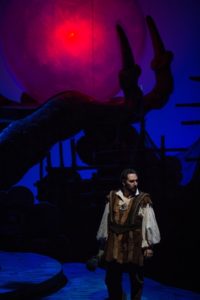
Turandot will continue at the Civic Opera House, 20 N Upper Wacker Drive, Chicago, thru January 27, with the following showtimes:
December 17 2:00 pm
January 10 7:30 pm
January 13 7: 30 pm
January 17 2:00 pm
January 21 2:00 pm
January 27 7:30 pm
Running time is two hours and fifty minutes with two intermissions.
The Lyric offers parking deals with Poetry Garage at 201 W Madison St. if inquired about in advance. Tickets are $17-332; to order, visit LyricOpera.org or call 321-827-5600.
To see what others are saying, visit www.theatreinchicago.com, go to Review Round-Up and click at “Turandot.”

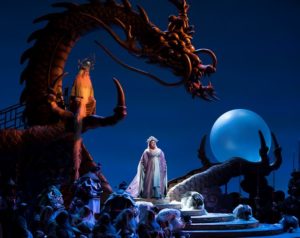
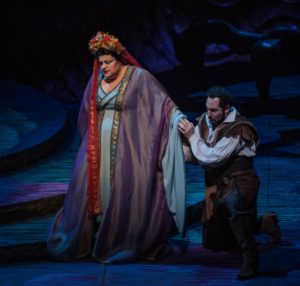


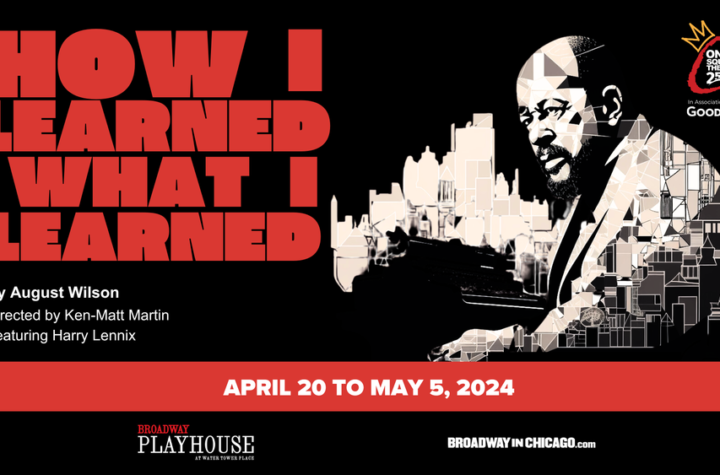


More Stories
“Joe Turner’s Come and Gone”
“How I Learned What I Learned” reviewed by Julia W. Rath
“How to Know the Wild Flowers: A Map” reviewed by Julia W. Rath